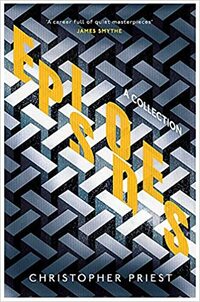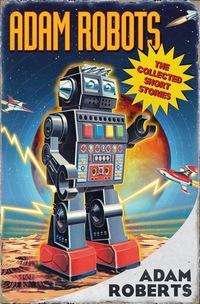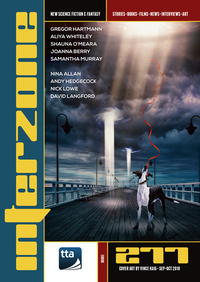Review:
Hogfather, by Terry Pratchett
| Series: |
Discworld #20 |
| Publisher: |
Harper |
| Copyright: |
1996 |
| Printing: |
February 2014 |
| ISBN: |
0-06-227628-X |
| Format: |
Mass market |
| Pages: |
402 |
Hogfather is the 20th Discworld novel and not a very good place to
start. I recommend at least reading
Soul
Music first for a proper introduction to Susan, and you may want to
start with
Mort.
When we last saw Susan, she was a student at the Quirm College for Young
Ladies. Now she's a governess for two adorable youngsters, a job that
includes telling them stories and dealing quite capably with monsters in
the cellar. (She uses a poker.) It also includes answering questions
like whether the Hogfather really exists or whether the presents just come
from your parents.
"Look at it this way, then," she said, and took a deep mental breath.
"Wherever people are obtuse and absurd... and wherever they have, by
even the most generous standards, the attention span of a small
chicken in a hurricane and the investigative ability of a one-legged
cockroach... and wherever people are inanely credulous, pathetically
attached to the certainties of the nursery and, in general, have as
much grasp of the physical universe as an oyster has of
mountaineering... yes, Twyla: there is a Hogfather.
Meanwhile, the Auditors, last seen meddling with Death in
Reaper Man, approach the Assassin's
Guild in Ankh-Morpork to hire the assassination of the Hogfather. This
rather unusual assignment falls to Mister Teatime, an orphan who was taken
in by the guild at an early age and trained to be an assassin. Teatime is
a little unnerving, mostly because he enjoys being an assassin. Rather a
lot.
Hogfather has two major things to recommend it: it's a Death novel,
and it features Susan, who is one of my favorite Discworld characters. It
also has two major strikes against it, at least for me.
The first is relatively minor but, for me, the most irritating. A bit of
the way into the story, Pratchett introduces the Oh God of Hangovers
fair, that's a good pun and then decides that's a good excuse for nausea
and vomiting jokes. A
lot of nausea and vomiting jokes.
Look. I know a lot of people don't mind this. But I beg authors (and,
even more so, filmmakers and cartoonists) to consider whether a joke that
some of your audience might like is worth making other parts of your
audience feel physically ill while trying to enjoy your work. It's not at
all a pleasant experience, and while I handle it better in written form,
it still knocks me out of the story and makes me want to skip over scenes
with the obnoxious character who won't shut up about it. Thankfully this
does stop by the end of the book, but there are several segments in the
middle that were rather unpleasant.
The second is that Pratchett tries to convince the reader of the mythical
importance of the Santa Claus myth (for which Hogfather is an obvious
stand-in, if with a Discworld twist), an effort for which I am a highly
unsympathetic audience. I'm with Susan above, with an extra helping of
deep dislike for telling children who trust you something that's literally
untrue. Pratchett does try: he has Death makes a memorable and
frequently-quoted point near the end of the book (transcribed below) that
I don't entirely agree with but still respect. But still, the book is
very invested in convincing Susan that people believing mythology is
critically important to humanity, and I have so many problems with the
literalness of "believing" and the use of trusting children for this
purpose by adults who know better.
There are few topics that bring out my grumpiness more than Santa Claus.
Grumbling aside, though, I did enjoy this book anyway. Susan is always a
delight, and I could read about her adventures as a governess for as long
as Pratchett wanted to write them. Death is filling in for the Hogfather
for most of the book, which is hilarious because he's far too good at it,
in his painfully earnest and literal way, to be entirely safe. I was less
fond of Albert's supporting role (who I am increasingly coming to dislike
as a character), but the entire scene of Death as a mall Santa is
brilliant. And Teatime is an effective, creepy villain, something that
the Discworld series doesn't always deliver. The powers arrayed on
Discworld are so strong that it can be hard to design a villain who
effectively challenges them, but Teatime has a sociopathic Professor
Moriarty energy with added creepiness that fills that role in this book
satisfyingly.
As is typical for Pratchett (at least for me), the plot was serviceable but
not the highlight. Pratchett plays in some interesting ways with a
child's view of the world, the Unseen University bumbles around as a side
plot, and it comes together at the end in a way that makes sense, but the
journey is the fun of the story. The conclusion felt a bit gratuitous,
there mostly to wrap up the story than something that followed naturally
from the previous plot. But it does feature one of the most quoted bits
in Discworld:
"All right," said Susan. "I'm not stupid. You're saying humans
need... fantasies to make life bearable."
REALLY? AS IF IT WAS SOME KIND OF PINK PILL? NO. HUMANS NEED
FANTASY TO BE HUMAN. TO BE THE PLACE WHERE THE FALLING ANGEL MEETS
THE RISING APE.
"Tooth fairies? Hogfathers? Little "
YES. AS PRACTICE. YOU HAVE TO START OUT LEARNING TO BELIEVE THE
LITTLE LIES.
"So we can believe the big ones?"
YES. JUSTICE. MERCY. DUTY. THAT SORT OF THING.
"They're not the same at all!"
YOU THINK SO? THEN TAKE THE UNIVERSE AND GRIND IT DOWN TO THE FINEST
POWDER AND SIEVE IT THROUGH THE FINEST SIEVE AND THEN SHOW ME ONE ATOM
OF JUSTICE, ONE MOLECULE OF MERCY. AND YET Death waved a hand. AND
YET YOU ACT AS IF THERE IS SOME IDEAL ORDER IN THE WORLD, AS IF THERE
IS SOME...SOME RIGHTNESS IN THE UNIVERSE BY WHICH IT MAY BE JUDGED.
"Yes, but people have got to believe that, or what's the
point "
MY POINT EXACTLY.
Here's the thing, though: Susan is right. They're
not the same
sort of thing at all, and Pratchett doesn't present an argument that they
are. Death's response is great, but it's also a non sequitur: it is true
and correct but has nothing to do with Susan's argument. Justice is not a
lie in the sense that Santa Claus is a lie: justice is something that
humans can create, just like humans can create gift-giving or a tradition
of imaginative story-telling. But this is not at all the same thing as
encouraging children to believe in the literal existence of a fat man in
red who comes down chimneys to deliver gifts by magic.
And Death isn't even correct
in Discworld! If one pays careful
attention to the story, the consequences he's thinks would follow from the
Auditors' attempt on the Hogfather not only don't happen, the exact
opposite happens. This is the point of the Unseen University
subplot, and it's also what happened in
Reaper Man. The Auditors
may be trying to kill mythology, but what the books show is that the real
danger comes from the backlash. The force they're meddling with is far
more powerful and persistent than they are.
Death appears to be, by the stated events of the story, completely
incorrect in his analysis of Discworld's metaphysics. Maybe Pratchett
knows this? He did write a story that contradicts Death's analysis if one
reads it carefully. But if so, this is not obvious from the text, or from
Susan's reaction to Death's speech, which makes the metaphysics weirdly
unsatisfying.
So, overall, a mixed bag. Most of the book is very fun, but the
metaphysics heavily rest on a pet peeve of mine, and I
really could
have done without the loving descriptions of the effects of hangovers.
This is one of the more famous Discworld novels for the above quote, and
on its own this is deserved (it's a great quote), but I think the logic is
muddled and the story itself contradicts the implications. A rather odd
reading experience.
Followed by
Jingo in publication order, and
Thief of Time
thematically.
Rating: 7 out of 10

 I probably would have to get a new motherboard for my desktop probably in a year or two as quite a few motherboards also have WiFi (WiFi 6 ?) think on the southbridge. I at least would have a look in new year and know more as to what s been happening. For last at least 2-3 years there has been a rumor which has been confirmed time and again that the Tata Group has been in talks with multiple vendors to set chip fabrication and testing business but to date they haven t been able to find one. They do keep on giving press conferences about the
I probably would have to get a new motherboard for my desktop probably in a year or two as quite a few motherboards also have WiFi (WiFi 6 ?) think on the southbridge. I at least would have a look in new year and know more as to what s been happening. For last at least 2-3 years there has been a rumor which has been confirmed time and again that the Tata Group has been in talks with multiple vendors to set chip fabrication and testing business but to date they haven t been able to find one. They do keep on giving press conferences about the 





 So much for my monthly blogging! Here s what I have been up to in the Open Source world over the last 6 months.
Debian
So much for my monthly blogging! Here s what I have been up to in the Open Source world over the last 6 months.
Debian
 A release of
A release of